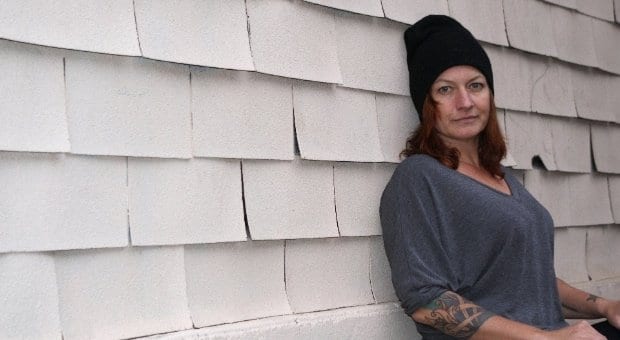For several months each year, Heather Luna-Rose treks daily to Bangkok, Thailand’s Bwan Kwang Central Prison. In Thai, it’s called “Big Tiger” because it eats men alive.
Through a phone and separated by bars and glass, she visits prisoners and reminds them they have not been forgotten by the world beyond the prison walls.
“Their eyes are haunted but so full of joy and light when they get a visit. They’re so happy to . . . have a conversation in a place where they’re treated like an animal,” she says, her eyes moist with tears.
The queer BC woman visits some of Southeast Asia’s harshest prisons to bring emotional support to incarcerated foreign nationals, some of them gay, as they face indeterminate sentences in conditions most would consider subhuman and unimaginable.
“Visiting wounded and deeply marginalized people brings a spark of light, joy and hope to very dark places,” Luna-Rose, 41, says. “Building human relationships based on compassion, respect and dignity can have transformational effects in institutions built only for degradation and violence.”
“I knew right away it was my soul’s calling,” she tells Xtra. “It’s incredibly emotionally exhausting, challenging, yet spiritually rewarding work. It’s hard to convey the pain and suffering I see.”
Luna-Rose offers conversation, food and emotional support, as a critical lifeline to these forgotten men.
“I see so much suffering, and I bear witness to so much pain. I feel so much hope for the world by visiting people and reaching out. I see the transformation in people in reaching out in their isolation and loneliness.”
She says there’s a spectrum of gender diversity in the prisons.
“One inmate asked me to bring him neon-pink, thigh-high stockings, and I did,” she says. “He put them on and he told me that other guys said, ‘You better not be wearing those.’ He just wanted to express himself and he did.”
She also mentors and facilitates volunteer visitors and pen-pal connections, to reach out to as many inmates as possible.
“Inmates aren’t provided with food, water, sleeping space. You have to buy it yourself. Anything you need for survival.”
Some support themselves in prison.
“There’s lots of ladyboys in the prisons,” she says. “They end up doing a lot of the sex work in the prisons.”
Luna-Rose’s work has led other people in the queer community to reach out to her and ask how they can help. One such man, she says, will be meeting her in Bangkok later this year to start visiting gay men in the Thai prison system.
“I definitely have members of the gay community who ask to support inmates or specifically to meet gay inmates,” she says.
“There are gay people in these prisons,” she continues. “Some of them have been convicted of pedophilia because of the homophobia surrounding their activities, surrounding their sexuality.
“As human beings, they are humiliated, they are degraded, their rights are violated,” says Luna-Rose, who has a master’s in education from the University of Victoria, where she wrote her thesis on homophobia and isolation in rural Canada.
She is careful to note that she does not think prisoners should not serve time for their crimes. For her, the issue is about the conditions of the prison and helping alleviate the pain wrought by those conditions.
Luna-Rose says her journey evolved from her experience of violence and pain in her younger years.
“I spent a lot of my life in prisons of mental illness, addiction and terror,” she says.
In her quest to find peace, Luna-Rose turned to activism in the feminist and queer communities.
“I think I found a lot of myself in them,” she says. “I somehow felt I was too broken to be fixed. There was so much in these communities that resonated with me, but I felt I didn’t connect with the human world.”
Seeking something more, she sold her belongings and, with her young daughter in tow, set out backpacking around Southeast Asia in 2006. In Bangkok, she visited the Canadian embassy and asked about visiting imprisoned Canadians.
“I picked the first name on the list and visited him. It changed my life.”
Her prison work is done primarily through her own fundraising, a continuously challenging task, she says. She also acts as a conduit for prisoners to help support their families back home.
In 2010, she sent artwork by Ukrainian prisoner Felix Cheremnykh to a Hope in Dark Places exhibit at ArtSpring gallery on Salt Spring Island. “I was able to send $3,000 to his mother in the Ukraine from the sales of his artwork, bringing a huge boost to his family, allowing him to feel like a contributing member of his family again, restoring a much eroded sense of self-worth,” she says.
Luna-Rose says overcrowding and a lack of adequate sanitation makes diarrhea, skin rashes and other illnesses unremarkable in the prisons, while tuberculosis, HIV and other serious diseases are dangerously common.
“Diarrhea is not even remarkable,” she says. “It’s normal.”
She says prisoners cite the lack of any intellectual stimulation as the most difficult aspect of their incarceration and says they battle depression, despair and hopelessness, in addition to the acute loneliness of being so far from family, friends and home country.
Human-rights organizations such as Amnesty International have repeatedly cited Bang Kwang for its severe overcrowding, use of leg restraints, torture, inadequate sanitation and medical care in violation of international standards of prisoner treatment.
Before returning to Thailand in November, Luna-Rose is working to crowd-source funding for her work.
Further details, along with prisoner art and letters, can be found at thailandprisonersupport.org.

 Why you can trust Xtra
Why you can trust Xtra


